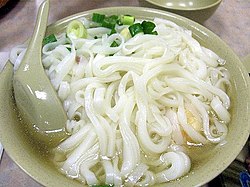Shahe fen

A thinner version of Shahe fen
|
|
| Alternative names | Hor fun, many others |
|---|---|
| Type | Chinese noodles |
| Place of origin | China |
| Region or state | Shahe District |
| Main ingredients | Rice |
| |
|
| Shahe fen | |||||||||||||||||||
| Chinese | 沙河粉 | ||||||||||||||||||
|---|---|---|---|---|---|---|---|---|---|---|---|---|---|---|---|---|---|---|---|
|
|||||||||||||||||||
| hefen | |||||||||||||||||||
| Chinese | 河粉 | ||||||||||||||||||
|
|||||||||||||||||||
| Transcriptions | |
|---|---|
| Standard Mandarin | |
| Hanyu Pinyin | shā hé fěn |
| Hakka | |
| Romanization | sa ho fun |
| Yue: Cantonese | |
| Jyutping | saa1 ho4 fan2 |
| Southern Min | |
| Hokkien POJ | sa-hô-hún |
| Transcriptions | |
|---|---|
| Standard Mandarin | |
| Hanyu Pinyin | hé fěn |
| Hakka | |
| Romanization | ho fun |
| Yue: Cantonese | |
| Jyutping | ho4 fan2 |
| Southern Min | |
| Hokkien POJ | hô-hún |
Shahe fen or he fen is a type of wide Chinese noodle made from rice.
While shahe fen and he fen are transliterations based on Mandarin, there are numerous other transliterations based on Cantonese, which include ho fen, hofen, ho-fen, ho fun, ho-fun, hofoen (a Dutch transliteration in Suriname), hor fun, hor fen, sar hor fun, etc. In addition, shahe fen is often synonymously called kway teow (粿條), literally "ricecake strips", transliteration based on Min Nan Chinese, POJ: kóe-tiâu) or guotiao (pinyin: guǒtiáo; the corresponding transliteration of Mandarin), as in the name of a dish called char kway teow. However, shahe fen and kway teow are strictly and technically not the same (the latter being essentially ricecakes sliced into strips) and the Min Nans in general still consciously make a distinction between shahe fen and kway teow in their speech. Original ricecakes or its strips are very stiff in texture (even after cooking), making them unpopular with modern consumers.
It is also known in Sabah as da fen (大粉), means "wide vermicelli", due to its similarity of colour and texture to rice vermicelli.
These noodles are called guay tiew sen yai (Thai: เส้นใหญ่, meaning "large rice noodles") in Thailand, and kwetiau in Indonesia.
Shahe fen is believed to have originated in the town of Shahe (Chinese: 沙河; pinyin: Shāhé; Jyutping: Sa1ho4*2), now part of the Tianhe District in the city of Guangzhou, in the southern Chinese province of Guangdong, whence their name derives. Shahe fen is typical of southern Chinese cuisine, although similar noodles are also prepared and enjoyed in nearby Southeast Asian nations such as Vietnam, Thailand, Cambodia, Philippines, Malaysia, Indonesia and Singapore, all of which have sizeable Chinese populations.
...
Wikipedia
